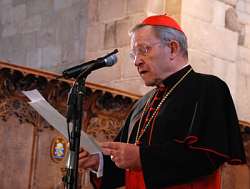Det lutherske verdensforbund har nettopp hatt et møte i Lund i Sverige, der de har feiret sitt eget 60-årsjubileum, og også sett framover. Ofte ble det nevnt at forskjeller ikke trenger true fellesskapet – vel fordi møtet diskuterte vanskelige ting som seksualetikk og familiespørsmål.
Vårt Land sier også at møtet diskuterte biskopens rolle. VL skriver bl.a.: I dokumentet slås det blant annet fast at biskoper skal opptre som ledere i kirken og være et pålitelig talerør i det offentlige rom. De er kalt til å være veiledere for menighetenes liv i det området de har ansvar for, spesielt gjennom å visitere menighetene og støtte fellesskapet deres. De har autoritet til og ansvar for å ordinere prester, og de skal ha tilsyn med forkynnelse og åndelig praksis i kirken, spesielt hos dem som er ordinert. Dette kan man ikke si er særlig klart, i alle fall ikke noe særlig teologisk – og jeg finner ingen ting om dette temaet på LWF’s nettsider.

Kardinal Kasper hilste sist søndag fra pave Benedikt, og sa bl.a. at paven paid tribute to the “always fruitful” dialogue between the LWF and Roman Catholic Church and the major progress in ecumenical relations after the Second Vatican Council.
“Ecumenical fellowship has [grown] all over the world through numerous encounters between Lutherans and Catholics,” said the pope in his greeting read to worshippers at the 25 March LWF 60th anniversary eucharistic worship service at the Lund Cathedral in Lund, Sweden. Walter Cardinal Kasper, president of the Pontifical Council for Promoting Christian Unity delivered the greeting.
The pope described the relations between the two communions as “a gift of the Holy Spirit” which at the same time “commits us not to slacken in our ecumenical endeavors in the spirit of our Lord’s prayer ‘that they may all be one’” (John 17:21).
“We are called in common witness to proclaim the saving message of the Gospel of Jesus Christ to a world suffering distress and seeking orientation at so many points. After all, “we boast in our hope of sharing the glory of God” (Romans 5:2b).
Of the major progress in ecumenical relations made since the 1960s, Pope Benedict singled out the solemn signing of the Joint Declaration on the Doctrine of Justification on 31 October 1999 in Augsburg, Germany. He noted that the questions currently calling for further clarification include, above all, the understanding of the Church, its sacraments and its ministries.
